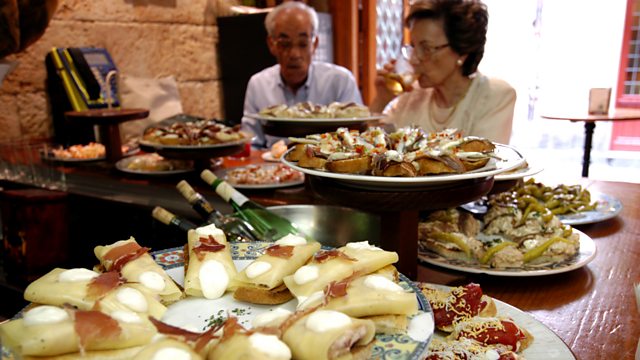Main content
Consumption and Our Identity
We are all consumers of essentials like food, water and heat, but why has consumption become a defining feature of our lives? With Frank Trentmann, Lyla Mehta and Eduardo Gómez.
What has been driving up the global levels of consumption – need? Government policies? Or, a hunger for social status? Bridget Kendall asks the historian of consumerism Frank Trentmann, the sociologist Lyla Mehta and the political scientist Eduardo Gómez to share their thoughts.
(Photo: People consuming tapas)
Last on
Wed 20 Jan 2016
02:06GMT
�鶹�� World Service Australasia
Clip
-
![]()
Is there enough water for 7bn of us?
Duration: 01:34
Frank Trentmann
Frank Trentmann is a
German specialist on consumerism and Professor of History at Birkbeck College,
University London. His most recent book is Empire of Things: How we became a
world of consumers, from the Fifteenth century to the Twenty-first. With an eye
to the present and the future, Professor Trentmann challenges the idea that
consumption originated as a purely Western phenomenon, fuelled by the US and
the West in the post war 1950's. He believes that being aware of this will help
us understand and control consumption today. He also argues that consumption is
largely determined by states and corporations, and has much less to do with
individual consumer choice than we might imagine.
Lyla Mehta
Professor Lyla Mehta is
an Indian-born sociologist whose work addresses access to water and other
natural resources around the world. She has extensive field research in India,
where she has studied the politics of water scarcity, and also South Africa,
Ethiopia and Bangladesh. Professor Mehta argues there is a great deal of
inequality in consumption around the world, and much of this has to do with
gender, culture and geography. Lyla Mehta is based at the Institute of
Development Studies at Sussex University in England where she is a Professorial
Research Fellow, and she is also a Visiting Professor at the Norwegian
University of Life Sciences in Norway.
Her most recent books include Limits to Scarcity and The politics and
poetics of water.
Eduardo Gómez
Dr Eduardo J. Gómez is a Colombian political scientist from
King's College London, where he is Senior Lecturer (Associate Professor) at the
King's International Development Institute.
His work tackles food consumption and public health in developing
countries like Brazil, where the increase in international trade and social
media means people are now consuming fatty fast foods in large amounts and
developing diseases like diabetes. So from being under-nourished in these
developing countries, many, apart from the very poor, have now become
dangerously over-nourished. Dr Gómez explores how governments are looking to
tackle the problem, and explains why Brazil is leading the field in this. He is
currently completing his second book titled The De-Emerging Nations:
International Politics, State-Civil Societal Ties, and the BRICS’ Struggle to
Eradicate Disease.
60 second Idea to Improve the World: Slow Down Leisure

In our Sixty Second Idea
to improve the world, the historian Frank Trentmann suggests slowing down
leisure because he believes growth in leisure activities is a key factor in
driving up consumption. He says that with all the travel and resources
involved, leisure has become unsustainable. So he proposes having one hour a
day where people are legally obliged to be idle.
Photo credit: Shan Pillay
Photo credit: Shan Pillay
Broadcasts
- Mon 18 Jan 2016 02:06GMT�鶹�� World Service except Americas and the Caribbean, Australasia & News Internet
- Mon 18 Jan 2016 05:06GMT�鶹�� World Service Americas and the Caribbean
- Tue 19 Jan 2016 09:06GMT�鶹�� World Service except News Internet
- Tue 19 Jan 2016 13:06GMT�鶹�� World Service Australasia
- Tue 19 Jan 2016 23:06GMT�鶹�� World Service except News Internet
- Wed 20 Jan 2016 02:06GMT�鶹�� World Service Australasia
Do you use US dollars even though they are not your country’s official currency?
Podcast
-
![]()
The Forum
The programme that explains the present by exploring the past




